
The shirt is such an integral part of any outfit, there are some places that won’t allow you to be served if you don’t have one on. Some parts of an outfit you can forget or leave behind. But the shirt? It’s terribly difficult to get by without one.
It seems like such a straightforward, simple thing to wear, but finding the perfect fit for a shirt is all about knowing what you want and finding how to match it to your body.
FYI, thanks to AI imagery software, we’re able to create very specific fashion examples to illustrate the points being made.
Choosing the Fit
All shirts aren’t made to look the same or fit the same way, not even when it comes to T-shirts. The design of the T-shirt is extremely well-known but it’s hardly a single, standard cut that is used across the board. In fact, T-shirts come in a variety of different fits. Choose the type of fit you want based on the overall look you want.

If you want a more form-fitting look, a slim fit may be the best choice for you. Slim fit may also be called trim fit. A regular fit, or standard fit, is tailored to the body. It’s not baggy, but also not form-fitting. It is comfortable in the waist and chest, but not roomy.
Classic fit, or original fit, is somewhat roomy and loose all over the body. This fit is comfortable and easy to move around in.
Plan Your Perfect Ensemble
Get 5 personalized outfit ideas with accessories in seconds

A fashion fit is slightly tapered through the waist to be more form-fitting and figure-flattering. The sleeves are smaller and a little more close-fitting, with high shoulder seams.
Shirt Size Types

Shirt Types
- Classic Fit: Original Fit
- Regular Fit: Standard Fit
- Slim Fit: Trim Fit
- Fashion Fit
Toddlers
Keeping toddlers in clothing can be tough because they keep changing size! Toddler clothing will often be marked in sizes but also in age ranges, to give you a general idea of what to get. But if you want to get a precise shirt size for your toddler, there are a couple of easy ways to do it.
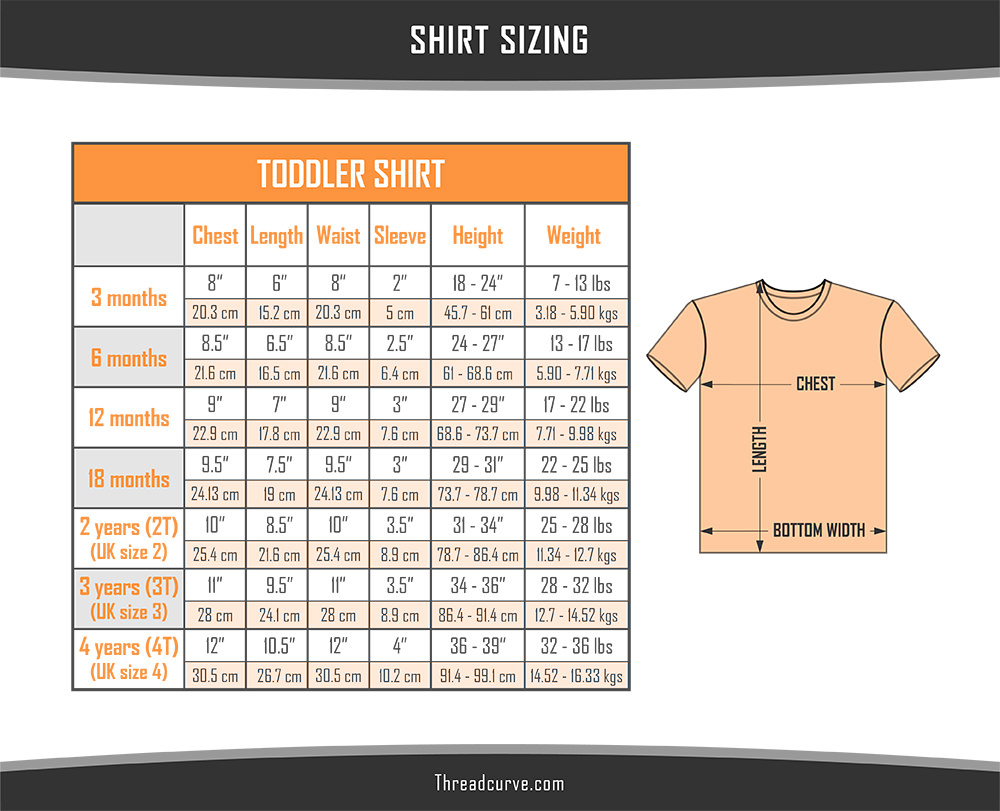
If you have a shirt that already fits your toddler well, measure this garment instead of trying to measure the toddler because the shirt will be able to sit still for you! Measure the shirt for length from the top of the shoulder seam to the bottom of the hem. Measure across the bottom, about an inch above the hem, and across the chest just under the armholes to get a width measurement.
If you haven’t got a shirt that fits the toddler, you can make a little game out of getting a measurement. Have the toddler hold up a sheet or large towel in front of themselves, with their arms stretched out wide. Quickly use a washable marker to draw the outline of a T-shirt around the toddler.
Make a game out of seeing if they can stay still and work as quickly as you can. You only need a rough outline to get a pretty accurate measurement.
Kids
Like clothing made in toddler sizes, clothing made for kids will often have sizes as well as age ranges listed. However, children grow at different rates. Your 8-year-old may be quite a bit bigger or smaller than the 8-year-old down the street, so the ages are more of a guideline than a rule. Accurate measurements are the best way to find the right size clothing.

Take measurements while the child is standing up straight and tall with their arms hanging naturally at their sides. Take the measurement across the chest under the armholes to get an accurate width. Measure from the edge of the collar bone down past the wait to the top of the hip to get an accurate length measurement.
Children’s Shirts Size Chart
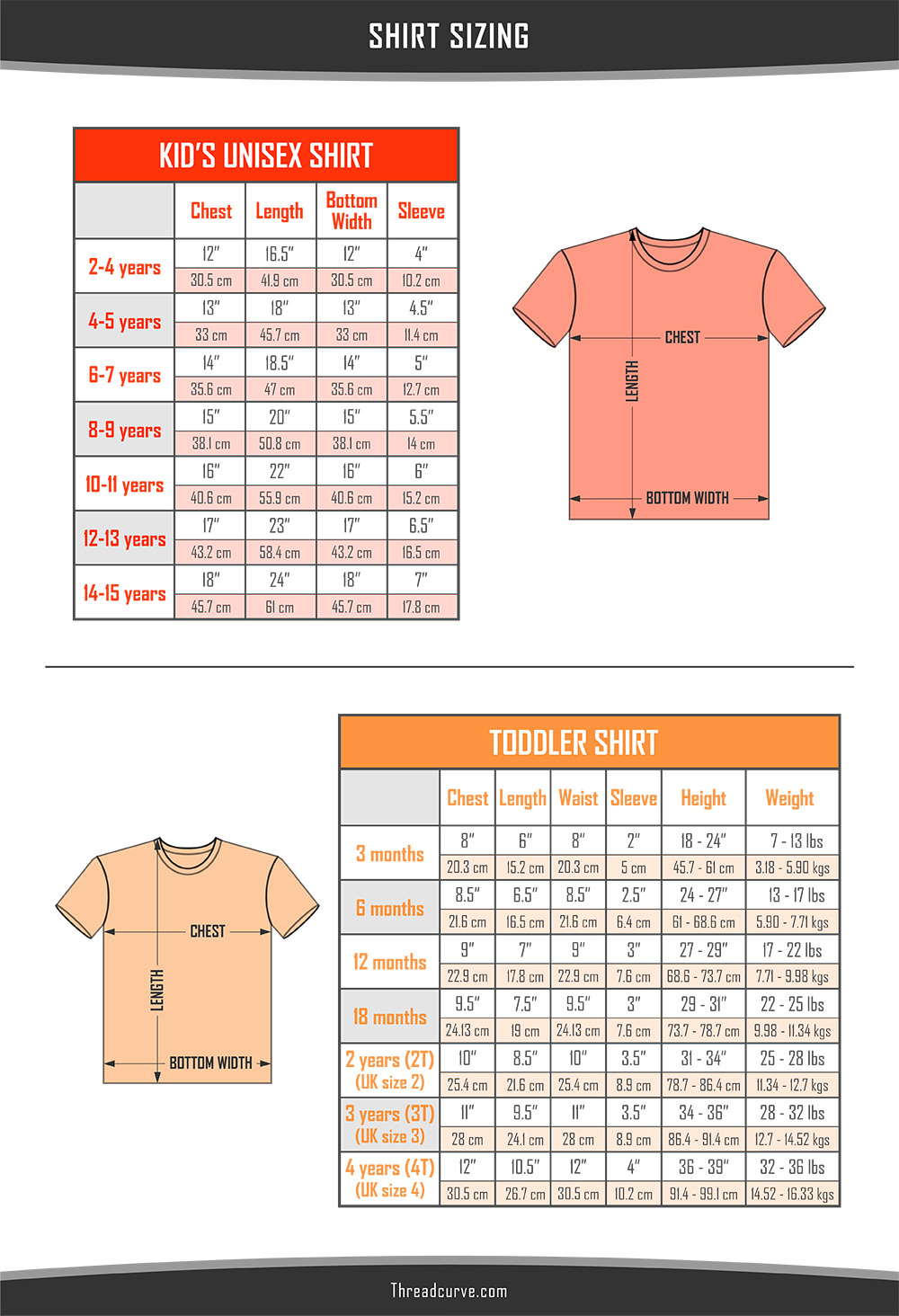
Clothing made for children will often be listed in sizes like “3T” and “4Y.” The “T” stands for toddler and the “Y” for kids. This will help you tell the difference between clothing specifically made in toddler sizes and clothing that is made for the bigger kids. Clothing for the smallest kids is made with the letter M, as in “3M” or “6M.” The M stands for months.
Kids Shirt Sizes
Size, Age, Chest x Length x Bottom Width x Sleeve 2Y-4Y (2-4 years), 12 x 16.5 x 12 x 4 4Y-5Y (4-5 years), 13 x 18 x 13 x 4.5 6Y-7Y (6-7 years), 14 x 18.5 x 14 x 5 8Y-9Y (8-9 years), 15 x 20 x 15 x 5.5 10Y-11Y (10-11 years), 16 x 22 x 16 x 6 12Y-13Y (12-13 years), 17 x 23 x 17 x 6.5 14Y-15Y (14-15 years), 18 x 24 x 18 x 7
Toddler Shirt Sizes
Size, Age / Weight, Chest x Length x Waist x Sleeve x Height 3M (3 months, 7-13 lbs), 8 x 6 x 8 x 2 x 18-24 6M (6 months, 13-17 lbs), 8.5 x 6.5 x 8.5 x 2.5 x 24-27 12M (12 months, 17-22 lbs), 9 x 7 x 9 x 3 x 27-29 18M (18 months, 22-25 lbs), 9.5 x 7.5 x 9.5 x 3 x 29-31 2T (2 years old, 25-28 lbs), 10 x 8.5 x 10 x 3.5 x 31-34 3T (3 years old, 28-32 lbs), 11 x 9.5 x 11 x 3.5 x 34-36 4T (4 years old, 32-36 lbs), 12 x 10.5 x 12 x 4 x 36-39
Men’s
Adult shirt sizes often come in small, medium, large, extra large, and extra extra large. These sizes will be marked as S, M, L, XL, and XXL. Sometimes, shirts are also available in extra small (XS) and extra extra extra large (XXXL).
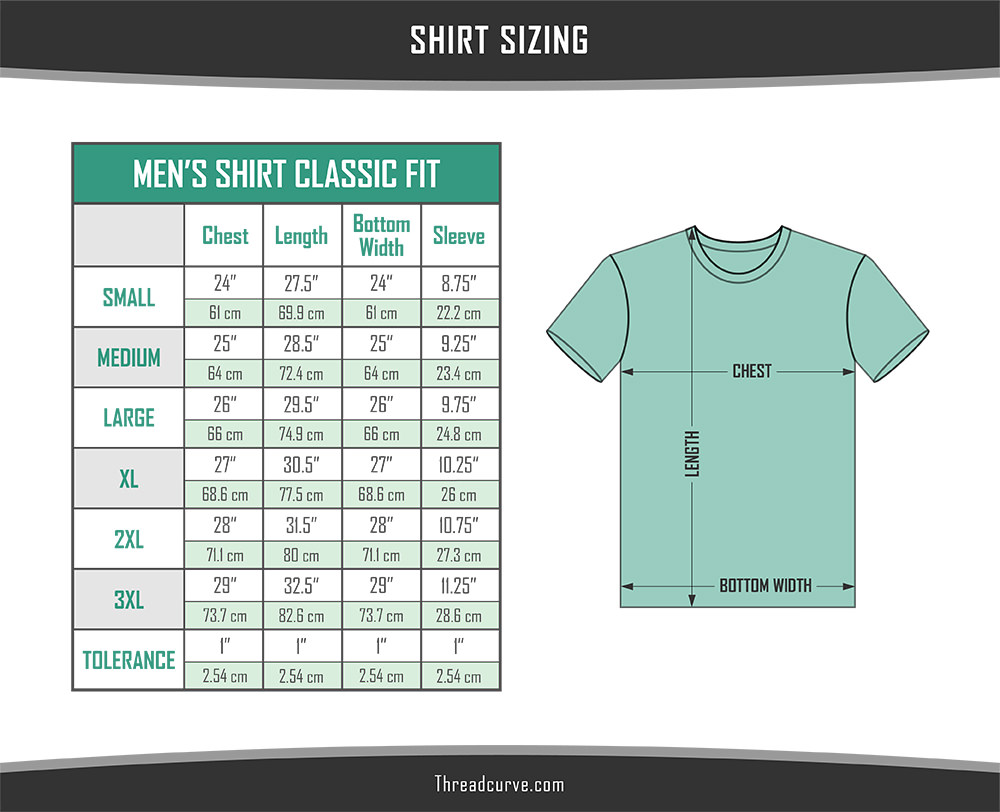
Men’s shirt sizes are based on chest, length, sleeve, and bottom width measurements. Your measurements may not fit one size exactly. This is very normal. Always go up, instead of down, when choosing a size. If you are an inch off on size, always choose the size that’s bigger than your measurement instead of smaller.
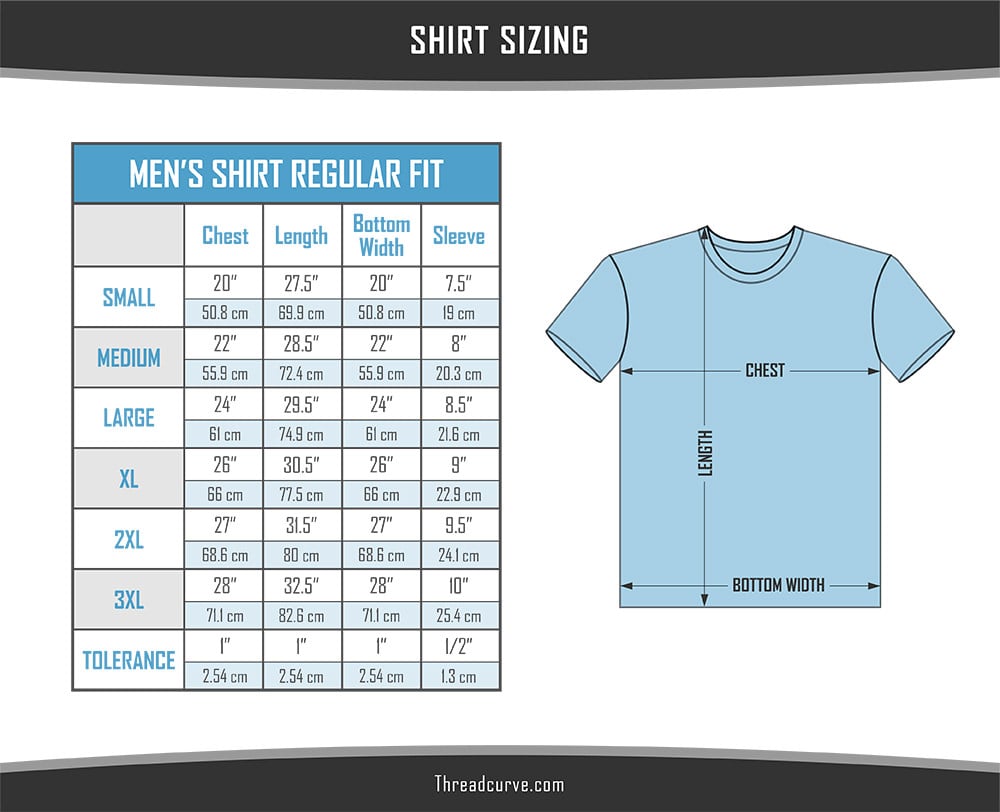
When taking measurements, you can take measurements directly from a shirt that already fits you perfectly or you can measure going off your own body. But when measuring from your body, remember to add a couple of inches if you want a roomier fit.

Men’s Shirts Size Charts

Men’s Classic Fit
Size, Chest x Length x Bottom Width x Sleeve S, 24 x 27.5 x 24 x 8.75 M, 25 x 2.5 x 25 x 9.25 L, 26 x 29.5 x 26 x 9.75 XL, 27 x 30.5 x 27 x 10.75 2XL, 28 x 31.5 x 28 x 10.75 3XL, 29 x 32.5 x 29 x 11.25
Men’s Regular Fit
Size, Chest x Length x Bottom Width x Sleeve S, 20 x 27.5 x 20 x 7.5 M, 22 x 28.5 x 22 x 8 L, 24 x 29.5 x 24 x 8.5 XL, 26 x 30.5 x 26 x 9 2XL, 27 x 31.5 x 27 x 9.5 3XL, 28 x 32.5 x 28 x 10
Men’s Slim Fit
Size, Chest x Length x Bottom Width x Sleeve S, 24 x 30.5 x 24 x 8.75 M, 25 x 31.5 x 25 x 9.25 L, 26 x 32.5 x 26 x 9.75 XL, 27 x 33.5 x 27 x 10.25 2XL (XXL), 28 x 34.5 x 28 x 10.75 3XL (XXXL), 29 x 35.5 x 29 x 11.25
Women’s
Women can certainly wear men’s shirt sizes and sometimes, even kid shirt sizes. However, women’s shirts are designed specifically for the woman’s natural shape. The shoulders, sleeves and chest will typically fit differently in a woman’s shirt as compared to a man’s shirt.

You can always measure your body and purchase a men’s shirt based on these sizes, but any shirt will fit much better if you choose a woman’s size. Stand up straight with your shoulders back when measuring for shirt sizes.

Women’s Shirts Size Charts
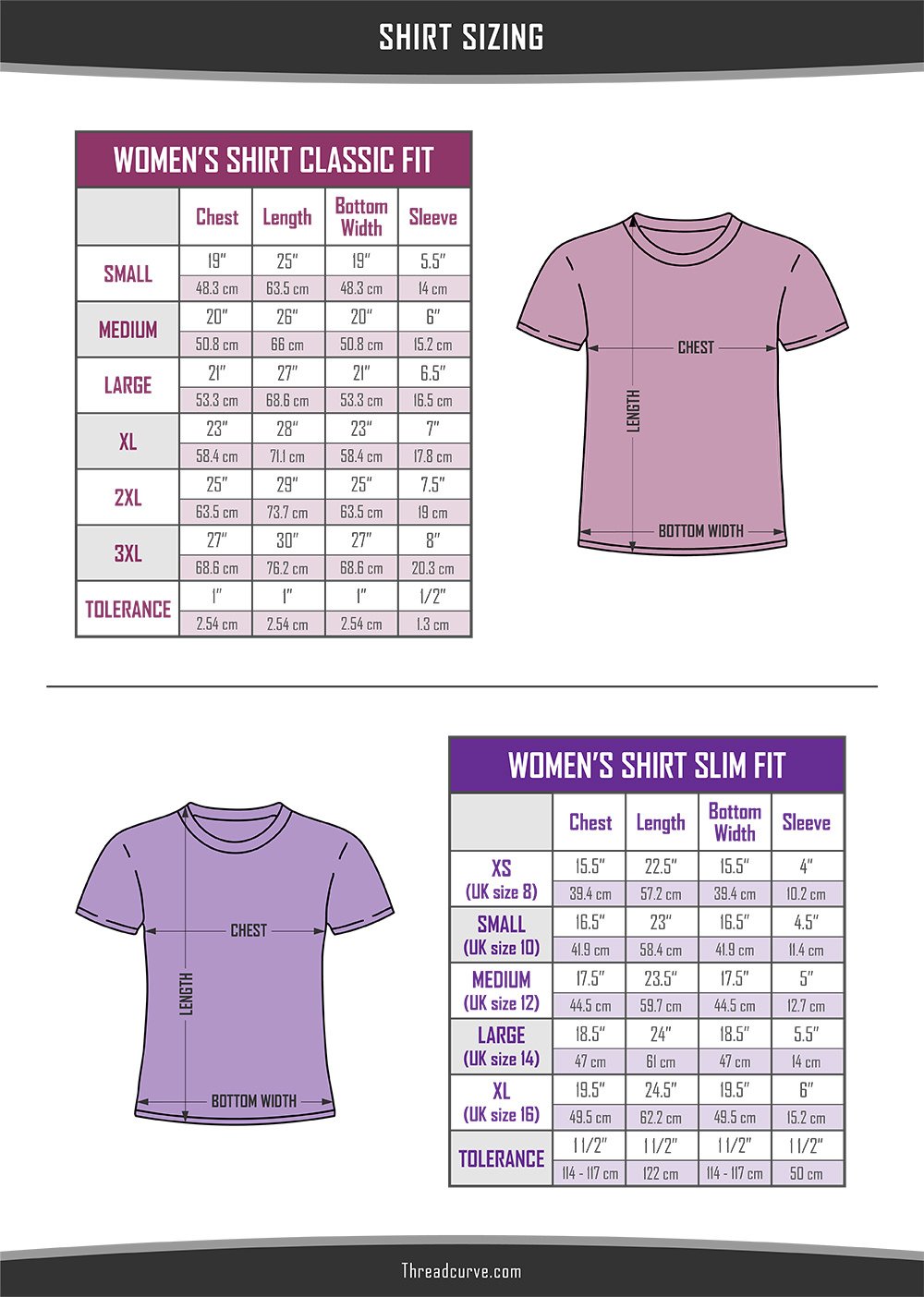
Women’s Classic Fit
Size, Chest x Length x Bottom Width x Sleeve S, 19 x 25 x 19 x 5.5 M, 20 x 26 x 20 x 6 L, 21 x 27 x 21 x 6.5 XL, 23 x 28 x 23 x 7 2XL (XXL), 25 x 29 x 25 x 7.5 3XL (XXXL), 27 x 30 x 27 x 8
Women’s Slim Fit
Size, Chest x Length x Bottom Width x Sleeve XS, 15.5 x 22.5 x 15.5 x 4 S, 16.5 x 23 x 16.5 x 4.5 M, 17.5 x 23.5 x 17.5 x 5 L, 18.5 x 24 x 18.5 x 5.5 XL, 19.5 x 24.5 x 19.5 x 6
FAQs
If you’ve got questions about shirts and how they fit, you aren’t alone. Get the answers to the most common shirt questions and a great-fitting shirt every time.
Are shirt sizes universal?
You will see the same sizes over and over again when you’re searching for new clothes, whether you see numbers or letters. But this does not mean that sizes are universal. Shirt sizes aren’t universal among manufacturers. Some brands may have their own idea about what a “medium” shirt is so that you can have a medium shirt from two different labels and find big differences in the size of each shirt. However, measurements are universal. Clothing companies have their own sizing charts, which you can use to look at exact measurements and get the exact right fit for your body.
Are shirt sizes different in other countries, like the UK?
Sizes can vary greatly by country. For example, the U.S. and the UK use the same letters to denote sizes but the sizes have different measurements. You won’t wear the same shirt size in the UK as you do in the U.S.
Do jerseys use the same sizes as shirts?
Sports jerseys are a popular fashion look that is seen everywhere, not just at sporting events and during athletic activities. However, jerseys do use their own sizes. This can make it difficult to find a jersey that’s going to fit. Hockey jerseys and baseball jerseys commonly use a number system for their sizes that correspond to the more common letter system used for shirt sizes (small, medium, and so on). To get the right size jersey, get a sizing chart from the jersey seller and match up the numbers on the jersey to the size you typically wear in shirts.
How should a shirt fit on the shoulders?
If you’re looking for that perfect fit, base it off of your shoulders. This is where you want your shirt to feel and fit the best. Otherwise, you’re going to look and feel awkward. The seam of the shoulder should sit right near the curve of the shoulder. If it is too high, your sleeves are likely to ride up on your arms and cause you discomfort. If the seam is too low, your shirt is too big.
What do shirt sizes mean?
Shirt sizes are determined by specific measurements. The size of the collar, the length of the sleeve, the width of the chest, and the width of the waist correspond to the specific measurements used for each shift size (small, medium, large, and so on). In shirts, the waist measurement is usually the bottom hem of the shirt.
What size shirt should you wear?
Measure your body to get your basic numbers for chest, waist, and shirt length. Match your measurements up to size charts, depending on the type of fit you want, to figure out which size shirt will work best for you. Sources:
- Berri Kids – Children’s Clothing Sizes 101: Your Guide to Getting the Right Fit Every Time
- Boden – Children’s sizing guidelines
- Dickies – Men’s Shirts Fit Guide
- Fruit of the Loom – Make Yours Fit
- Hamilton – Standard Fit Guide
- Little Label – size chart
- Macy’s – The Dress Shirt Manual for Men
- The Style Guide – How Your Shirt Should Fit
- Wrigleyville Sports – Sizing Charts
Build Your Perfect Capsule Wardrobe
Create a curated collection of ~20 essential pieces that work together beautifully with AI-powered personalization!






